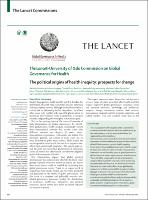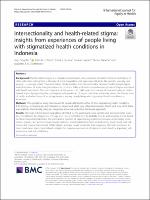| dc.description.abstract | Despite large gains in health over the past few decades, the distribution of health risks worldwide remains extremely and unacceptably uneven. Although the health sector has a crucial role in addressing health inequalities, its eff orts often come into confl ict with powerful global actors in pursuit of other interests such as protection of national security, safeguarding of sovereignty, or economic goals.
This is the starting point of The Lancet–University of Oslo Commission on Global Governance for Health. With globalisation, health inequity increasingly results from transnational activities that involve actors with diff erent interests and degrees of power: states, transnational corporations, civil society, and others. The decisions, policies, and actions of such actors are, in turn, founded on global social norms. Their actions are not designed to harm health, but can have negative side effects that create health inequities. The norms, policies, and practices that arise from global political interaction across all sectors that aff ect health are what we call global political determinants of health.
The Commission argues that global political determinants that unfavourably aff ect the health of some groups of people relative to others are unfair, and that at least some harms could be avoided by improving how global governance works. There is an urgent need to
understand how public health can be better protected and promoted in the realm of global governance, but this issue is a complex and politically sensitive one. Global governance processes involve the distribution of economic, intellectual, normative, and political resources, and to assess their eff ect on health requires an analysis of power.
This report examines power disparities and dynamics across a range of policy areas that aff ect health and that require improved global governance: economic crises and austerity measures, knowledge and intellectual property, foreign investment treaties, food security,
transnational corporate activity, irregular migration, and violent confl ict. | |




